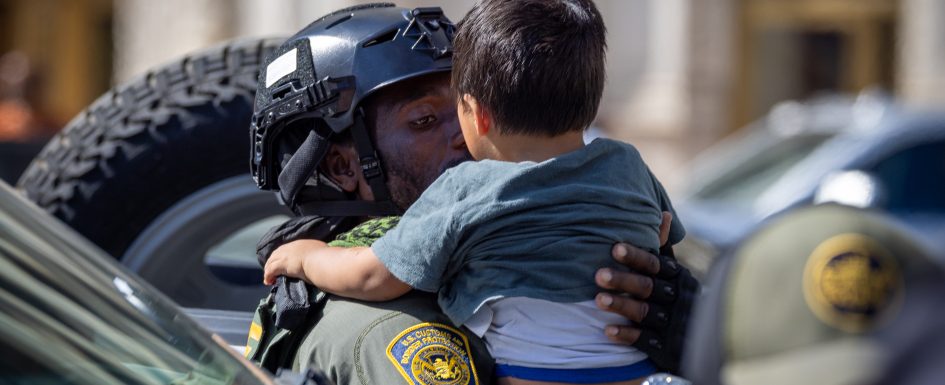Something about this photo stopped me.
It wasn’t the tactical gear or the government patch. It wasn’t even the tension behind the camera: federal officers in Chicago, a raid unfolding, people watching in fear or confusion. It was this moment. An officer, in full gear, holding a small child.
The photographer, Derek Nielsen, isn’t a journalist. He’s a nature and conservation photographer who happened to capture this scene while documenting his city. No political agenda, no press badge, just a person with a camera, using his gift to bear witness.
Among Derek’s images that day were officers with helmets, batons, and covered faces. Some looked hardened, some distracted, some indifferent. But this one didn’t fit. It wasn’t “us versus them.” It wasn’t anger or anxiety. It was… human.
Do you see something out of place in this photo? I see that the officer’s gloved hands are gentle. His eyes are soft. The child is clinging to him not out of fear, but with the kind of trust you see between a parent and child. In another photo taken moments earlier, that same child was tense, crying, resisting. But in this frame, something breaks through. You can see it: compassion, connection, light.
We’ve heard the phrase “just doing my job” used in defense of hard actions before. History has shown how sobering that phrase can be when it becomes a shield for cruelty or indifference. But this picture refuses to let us stay comfortable in easy categories of right and wrong, hero and villain.
Because for one fleeting second, the image becomes holy. It reminds me of the words of Dr. Martin Luther King Jr.: “Darkness cannot drive out darkness; only light can do that. Hate cannot drive out hate; only love can do that.” And it calls to mind 1 John 1:5: “God is light; in God there is no darkness at all.”
The author of 1st John isn’t naïve. He doesn’t deny that there’s darkness in the world. Injustice, fear, and the ways our world can wound the vulnerable and harden hearts. But the author insists that darkness doesn’t get the final word. God’s light breaks through. That’s what I saw in this photo. A glimmer of redemption in the middle of a moment soaked in controversy and pain.
Nothing here excuses the system or erases the injustice. But it’s a reminder that light and love are still possible, even here. That the image of God still flickers in both the powerless and the powerful, the detained and the detaining, the fearful child and the weary officer.
In times like ours, when outrage feels algorithmic and compassion feels countercultural, we must fight to stay openhearted. We cannot become the darkness we decry. We cannot mirror the contempt we condemn. We cannot let fear or fury determine our humanity.
The letter of 1st John tells us what to do instead: “If we walk in the light as God is in the light, we have fellowship with one another.” Fellowship—not agreement. Not comfort. Not silence. Fellowship means connection. It means choosing to see the divine image in every person, even when it’s buried under uniform or prejudice or fear.
When I saw this image, I prayed. That I might see the light of God in the faces I’m tempted to label.
That the Church might learn again how to shine without burning. That we might speak truth fiercely but love even more fiercely. Because in this photo, I saw something like grace. Grace that touches down in the mess, grace that holds on, grace that refuses to let go.
A Prayer for Light in the Darkness
God of all people,
You are light that no darkness can overcome.
When the world feels divided into sides,
teach us to see faces instead.
When fear shouts loud and love feels small,
make our compassion fierce.
When we encounter injustice,
let us speak truth with courage,
but never forget that even those who wound are wounded.
Open our hearts to your light
that we might be bearers of hope,
agents of mercy,
and builders of your beloved community.
Come, Lord Jesus.
Shine through the shadows.
And teach us to love in the way only light can.
Amen.

PS – Derek Nielsen, the photographer, wasn’t setting out to make a political statement that day. These aren’t the kind of photos Derek usually takes. But like so many of us, Derek felt compelled to do something rather than remain complacent. Derek later learned that the images were being monetized online, so he decided to turn that into good by donating every dollar of profit to organizations helping immigrant families affected by raids. That’s what light looks like in action.
This isn’t a political statement; it’s a human one.
I made a donation to ICCIR in honor of Derek and his witness through this photo. If you’re moved by Derek’s work, perhaps you might consider doing the same.

